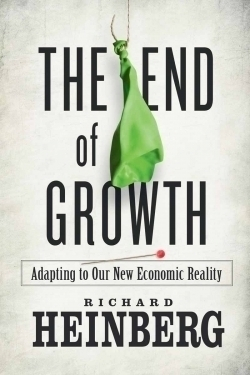The End of Growth
Adapting to Our New Economic Reality
- 2011 INDIES Winner
- Bronze, Business & Economics (Adult Nonfiction)
According to the International Energy Association, conventional crude oil production peaked in 2006. And most economists agree that as oil supplies grow tight, spikes in the price will slow down economic growth. Despite having the same data, oil industry economists insist Peak Oil is merely hype, a non-issue. As BP’s chief economist Christoph Rühl said in 2008, “Peak Oil has been predicted for 150 years. It has never happened, and it will stay this way.”
In his new book, The End of Growth: Adapting to Our New Economic Reality, Richard Heinberg moves the discussion beyond the validity of Peak Oil as a theory to explore the emerging challenges of measuring an economy that can no longer depend on unlimited supplies of fossil fuels, or any other natural resources.
Heinberg, a Peak Oil expert and Senior Fellow-in-Residence at Post Carbon Institute, has spoken and written extensively on this topic. His book The Oil Depletion Protocol won ForeWord magazine’s Gold Environmental Award in 2007. The End Of Growth marks his tenth published book.
The scope of The End of Growth is both overwhelming and audacious. Heinberg argues as energy resources tighten, exclusive use of growth-based metrics must change. This means investors will need to redefine progress and reevaluate priorities. They will no longer be able to expect unlimited increases in sales and services due to natural limits on resources. And a society used to shopping globally will have to adapt to a community-centric mindset such as Community Economic Laboratories (CELs). “The mission of a CEL,” writes Heinberg, “would be to increase personal and community resilience by bringing together in one place the essential elements of a new local, resilient economy.”
Before launching into what will or may happen, Heinberg builds a foundation that examines the impact of fossil fuels from the dawn of the industrial age to the present. His methodical style, careful application of graphs and sidebars, and his ability to breakdown complex ideas into lay terms without oversimplification makes his writing popularly accessible. His extensive citations create an excellent map for those with more than a passing interest who wish to read further.
Regardless of where one stands on the Peak Oil debate, it’s impossible to ignore Heinberg. Rather than shouting wild predictions of chaos and doom, The End of Growth offers a well considered study of the problems facing today’s markets and offers possible ways to adapt to an uncertain future. He says it best in closing, “We will be tempted to waste time apportioning blame for the failure of our existing economic and industrial systems, and venting anger over the greed and stupidity that stand in the way of building a new economy. None of that will help.” What will help is what he offers: fresh ideas and a willingness to move beyond the argument to find solutions.
Reviewed by
Joseph Thompson
Disclosure: This article is not an endorsement, but a review. The publisher of this book provided free copies of the book and paid a small fee to have their book reviewed by a professional reviewer. Foreword Reviews and Clarion Reviews make no guarantee that the publisher will receive a positive review. Foreword Magazine, Inc. is disclosing this in accordance with the Federal Trade Commission’s 16 CFR, Part 255.

